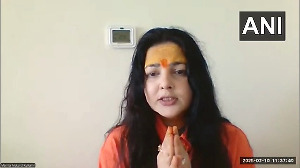 The apex court rejected the plea filed by the 30-year-old woman, saying it would not interfere with the high court's 'well-written judgment'.
The apex court rejected the plea filed by the 30-year-old woman, saying it would not interfere with the high court's 'well-written judgment'.
It also said the woman appeared to have responded in a 'positive manner' when they had met on the day of alleged incident and it was a case of 'relationship' in which they have known each other.
Peepli Live' co-director Mahmood Farooqui on Friday got a major relief from the Supreme Court which dismissed an American woman's plea challenging a Delhi high court verdict acquitting him in a rape case.
The top court said they were 'good friends' and she had even expressed her 'love' to him after the alleged incident.
It also said the woman appeared to have responded in a 'positive manner' when they had met on the day of alleged incident and it was a case of 'relationship' in which they have known each other.
The apex court referred to the e-mail communications between the 30-year-old woman and Farooqui and asked her counsel how could the woman say 'I love you' in her mail to the accused after the alleged 2015 incident, which she later termed as rape.
A bench comprising Justices S A Bobde and L Nageswara Rao observed that the high court's verdict of September 25 last year acquitting Farooqui was a 'well written judgment' warranting no interference.
"We are not satisfied (with her arguments). We will not interfere with the high court verdict. It is a well-written judgment," the bench told advocate Vrinda Grover, who was representing the woman.
Farooqui was earlier convicted and sentenced to seven-year jail term by a trial court in New Delhi in August 2016.
However, the high court had acquitted him in the case last year.
The Delhi Police had on June 19, 2015, lodged a first information report against Farooqui on the woman's complaint.
The police had filed a charge sheet against him alleging he had raped the research scholar from Columbia University at his Sukhdev Vihar house in South Delhi on March 28, 2015.
Farooqui had denied all the allegations.
During the hearing, the top court asked her counsel, "How many rape cases you have gone through where the prosecutrix (woman) has said 'I love you' to the alleged accused much after the alleged incident."
However, Grover told the bench that the matter related to 'forced oral sex' and the woman had not given her consent.
She said that the argument of alleged consensual relation was advanced by Farooqui's lawyer before the high court for the first time and claimed that this issue was not raised before the lower court during the trial.
But the bench observed that it was not a case where strangers came, met and did something as both Farooqui and the woman were known to each other.
"It is a case of relationship. They were known to each other," the bench said, adding, "This is a very hard case. We would like to say that it has been decided extremely well (by the high court). It is not a case which can be decided easily".
When the counsel said both the woman and Farooqui were known to each other, the bench asked, "According to her evidence, they had drinks together. The point is they knew each other, had drinks together and did many other things together".
Referring to the high court's verdict, Grover said the judgment said she was a 'sterling witness' and the issue was of consent.
She also argued that the woman had said 'no' to Farooqui's advance towards her.
"But initially 'yes'. There appeared to be a positive response by her which according to her was faked. People give false smiles. How would the other person know it is a false response. This is very difficult to understand," the bench said, adding that the high court had also observed that it was not reflected that she was saying 'no'.
However, her counsel claimed in the court that during the alleged incident, the woman was afraid that 'something bad' would happen with her as he had become forceful.
The bench then referred to the e-mail exchanged between the woman and Farooqui and said the records showed they were very good friends.
The court also asked the counsel as to how many times the woman had visited Farooqui's house and had drinks together.
It, however, clarified that the top court was not at all saying that if somebody visits the house of another regularly, then such act amounts to waiver of right to be protected against offence like rape.
The court also referred to a document in which the woman had said that she and Farooqui had exchanged kisses.
"This does not happen between friends," the bench said.
The lawyer said it was prior to the alleged incident and added, 'consent must be appreciated in terms of the incident in question and not prior intimacy'.
She also argued that 'refusal was clear in this case'.
The bench, while dismissing the plea, said it was not satisfied and would not interfere with the high court's judgment and no question of law was involved in the matter.
The high court had acquitted Farooqui saying it remained doubtful whether any such incident took place.
It had asked Tihar jail authorities to release Farooqui who was in custody following the trial court's order.
The high court had said in the order that 'the testimony of the victim is not reliable and there are discrepancies'.
The high court had, however, brushed aside her contention and noted that 'what the appellant has been communicated is, even though wrongly and mistakenly, that the prosecutrix is okay with it and has participated in the act'.
The trial court, which on July 30, 2016 had held Farooqui guilty of raping the woman in 2015 in a drunken state, had also imposed a fine of Rs 50,000 on him.











 © 2025
© 2025